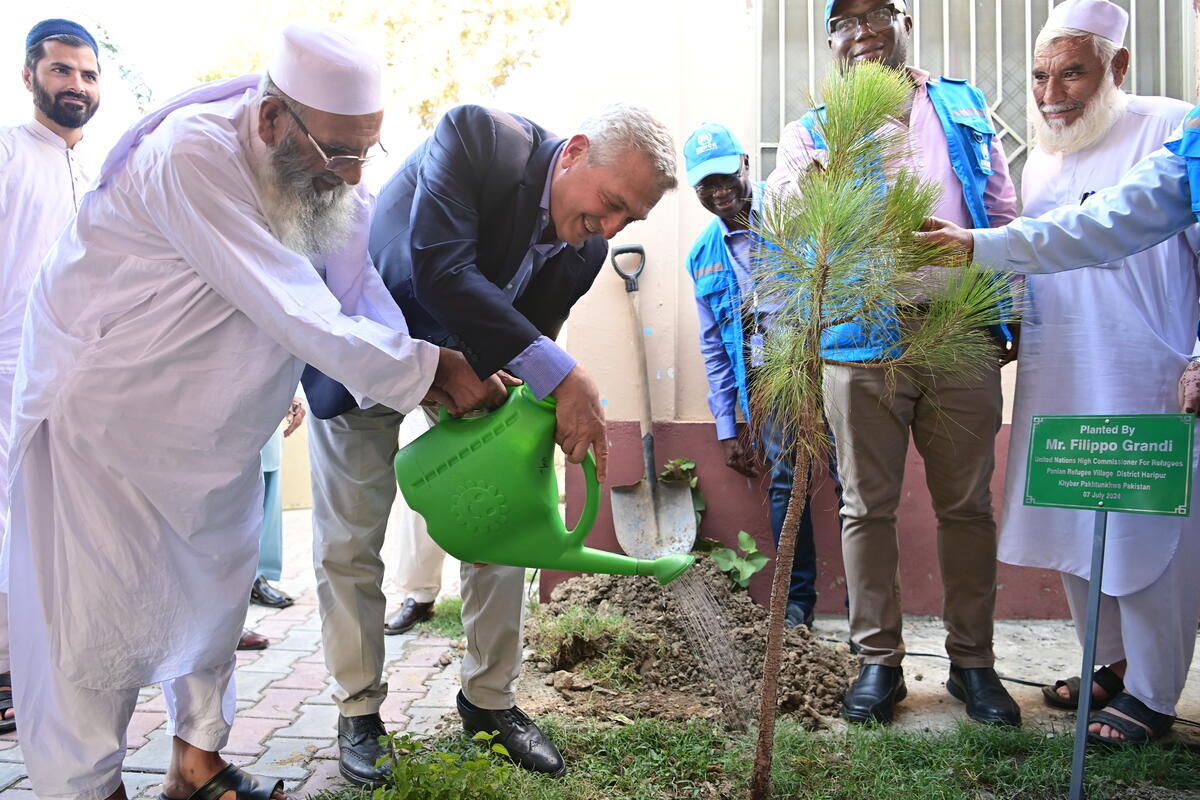Braille, brooms and pasta for needy Afghans
Braille, brooms and pasta for needy Afghans

JALALABAD, Afghanistan, October 10 (UNHCR) - Peering from behind his sunglasses with a big Versace sticker plastered over his left eye, Faisal Ghani comes across as a bit of a fashion victim. It's hard to imagine that he went blind while fighting for his beliefs and has now come home with a vision for his peers.
As a young man, Ghani fled the 1979 Soviet invasion of Afghanistan and worked for the mujahideen in north-western Pakistan. He lost his eyesight in an explosion but stayed in Pakistan to study and work. Soon after the Taliban regime collapsed in late 2001, Ghani returned home to Jalalabad in eastern Afghanistan's Nangarhar province.
Today, he is a broom-making instructor at the UNHCR-funded Blind Roshandillan Association of Afghanistan (BRAA). "This is an Islamic country, people respect and want to help us," he says. "But we should not be a burden on society, and I plan to have different trainings to help blind people become self-sufficient."
Since 2002, some 3.7 million Afghan refugees have repatriated with UNHCR assistance. The authorities work with UNHCR staff to identify and assess the most vulnerable and needy families for assistance.
In Jalalabad, the BRAA holds classes for 32 blind and disabled returnees in braille, basket-weaving and broom-making. Returnee Ihsanullah teaches braille - a system of dots which allows blind people to read and write - and he believes it will help his blind students to learn like other children once they are able to take notes. "I hope they can live like normal people and one day become lecturers and facilitators for other blind people," he says.
In Mazar-i-Sharif, northern Afghanistan, the department of refugees and repatriation (DoRR) says 80 of the 245 extremely vulnerable people assisted last year graduated from a pasta-making class and the rest were given cash grants of US$60-US$80 per family. Cash grants are given as short-term support for families with special needs, such as those headed by widows, or those with disabled people or very big families.
Shaujan, 40, and Shaima, 30, were both married to the same man before he died in Pakistan. The widows returned to Mazar in 2002 with their 16 children. After DoRR assessed their case and found them to be vulnerable, they were selected for the UNHCR-funded pasta-making project. Today, the family sets aside a room in their small home for making pasta, which is getting increasingly popular as it is cheaper than rice and cooks faster.
"We produce about three kilogrammes of pasta a day," says Shaujan. "Demand varies, but at least it helps us to buy food for the children. My eldest son does odd jobs to pay the rent."
Some of their classmates have joined a community forum, which helps them to buy ingredients and to market their products. "The more we sell, the more we can produce, the more money we make," says one woman. "Before, we were sitting at home doing nothing. Now at least we have some income."
The whole process takes 90 minutes. Eight women gather round the table, each with their own responsibilities. One mixes the flour with water, another kneads the dough. After the yeast rises, they roll the dough into little balls, flatten, layer and shred it through a hand-cranked pasta machine. The strings of pasta are then hung on a rack to be dried before packaging for sale.
"The course is useful and there are other classes at the forum, like embroidery and literacy. For 50 afghanis (US$1) a month, we can take different classes," says one of the woman, whose brother does not let her attend regular school.
Cash grants have also given returnees a new lease on life. Kamela, a widow, returned to Mazar last year with her seven children. "We had no equipment to restart our work. I felt really hopeless, I thought I had made the wrong decision to come back," she says. "Then I heard of an agency that helps returnees. I approached DoRR, and they paid many visits and did surveys of our family. Eventually they gave us US$60 to buy a sewing machine."
Today, Kamela makes dresses to order while her daughters are at school. They take over when they come home, charging 50-100 afghanis a dress. "It's cheaper than the market rate, but we don't have a choice, there's too much competition in this neighbourhood," says Kamela. "Our income is not fixed - sometimes more, sometimes less."
From livelihood to land, shelter, education and health, the needs of Afghan returnees are great. This year, UNHCR is allocating some US$15 million - half of its total annual budget for the country - for income-generating activities, vocational training and coexistence projects targeted at the most vulnerable.
By Vivian Tan in Jalalabad and Mazar-i-Sharif, Afghanistan









